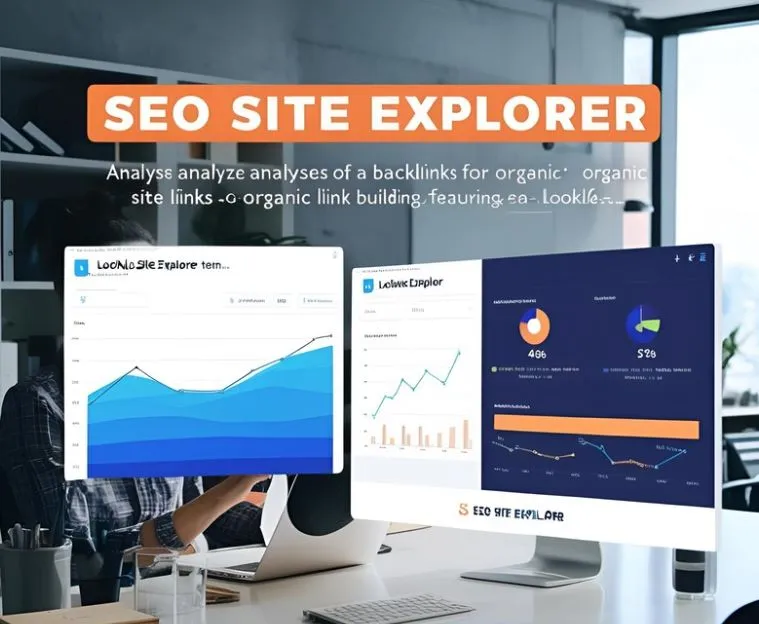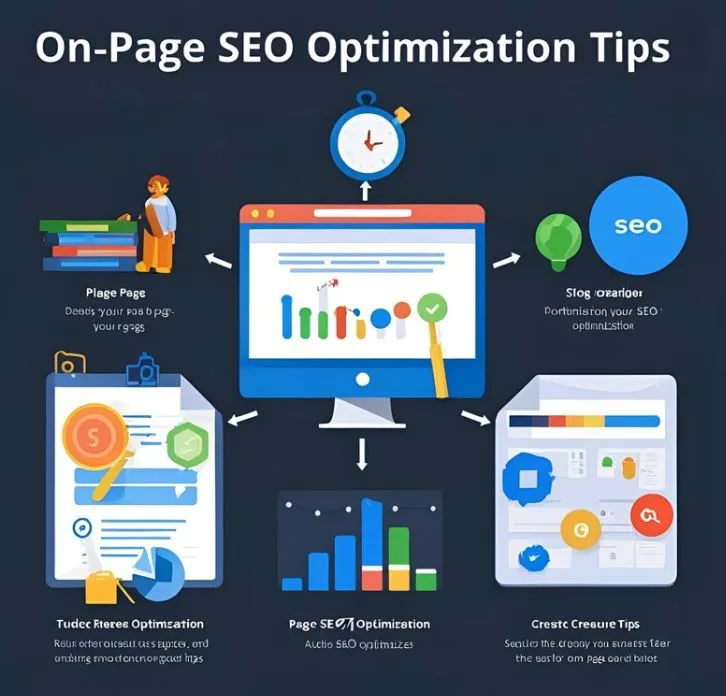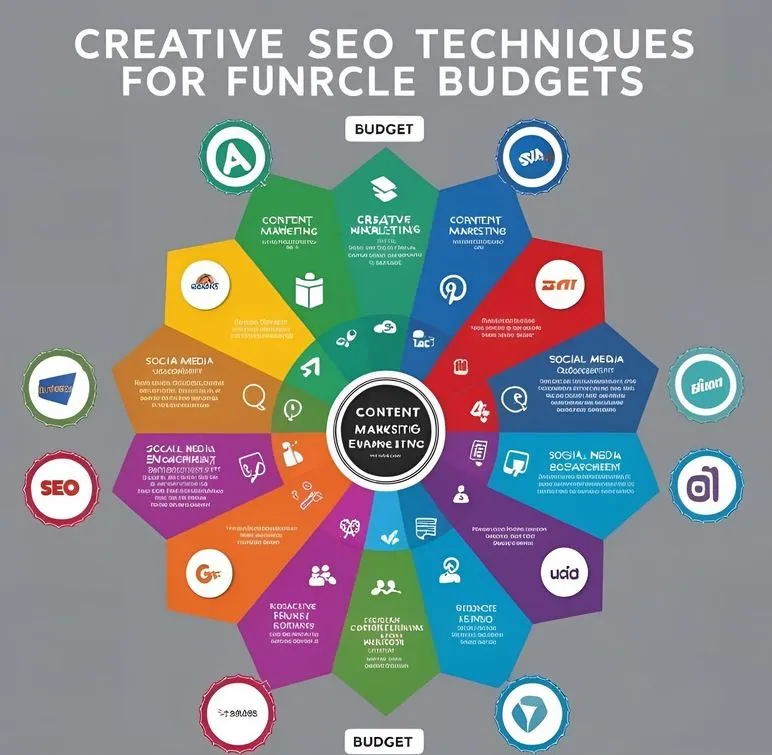
Link building remains essential for good SEO, but for many startups on a tight budget, getting quality backlinks can seem unattainable.
With the right tools, approach, and advice, you can generate valuable backlinks organically, completely free of charge.
Here, we explain how to do it effectively, how to find free backlinks with these tips, using Lookkle's SEO Site Explorer as your primary tool, and highlighting valuable sites and examples where you can find high-quality links from very valuable sites.
Analyze Your Competitors’ Backlinks with SEO Site Explorer
Understanding how your competitors are earning backlinks is one of the most effective strategies for building your own. With SEO Site Explorer by lookkle, you can perform in-depth backlink analysis on any domain or specific URL, even without advanced technical skills.
What can you discover using this feature?
- Top Linking Domains: Identify which websites are linking to your main competitors. This gives you a list of potential outreach targets for your own link building.
- Backlinks: Displays up to the 1,000 most relevant inbound links to your website, including the most recently added backlinks, ideal for monitoring new links. This way, you can sort them by date added, number of visits, and ranking.
- Backlinks by Domains: Groups backlinks by source domain, allowing you to see how many links come from each site, helping you identify the most influential domains.
- Backlinks to Exact URL: Allows you to see which links point to a specific page on your site, useful for content campaigns or key page analysis.
- Backlink Statistics: Provides a visual and numerical summary of your backlink profile: total links, unique domains, link type (dofollow/nofollow), anchor text difference, and percentage statistics for TLDs (i.e., the extensions of the linking domains).
- Latest Backlinks Added: Displays the most recently detected backlinks to your site, allowing you to see who links to you in real time and detect opportunities or threats.
- Backlink quality: Not all links are created equal. SEO Site Explorer lets you filter by metrics such as domain authority, link type (dofollow/nofollow), and discovery date.
- Anchor text analysis: Understand which keywords or phrases are being used in backlinks to your competitors, guiding your own keyword strategy.
Practical example:
Let’s say you run a startup offering a productivity tool and you're competing with Notion. With SEO Site Explorer, you can:
-
Enter Notion’s domain.
-
Go to the "Backlinks" tab.
-
Discover which pages on Notion are getting the most links.
To do this, in the sample table, we sort by "URL TO." Logically, we see that the main domain's page receives the most links. -
Create similar content or pitch your product to those linking sites with a fresh, valuable angle.
We go to each of the linked pages and look at their content. For blog posts, we simply look at the title and content and try to create content that's superior and more engaging for the user.

Why is this important for startups?
Because it saves time and eliminates guesswork. Instead of randomly trying to build links, you can use real data to:
-
Identify genuine backlink opportunities.
-
Prioritize websites that are already linking to similar products.
-
Fine-tune your content to increase its chances of getting linked.
Create Link-Worthy Content That Attracts Backlinks
No matter how good your outreach is, you won’t earn high-quality backlinks if your content isn’t worth linking to. That’s why the foundation of any successful organic link building strategy is to create link-worthy content—the kind people naturally want to reference, share, or cite.
What Makes Content “Link-Worthy”?
-
Original research or data: Stats, surveys, or case studies are magnets for backlinks. If you’re the source of new information, others will naturally link to you.
-
Comprehensive guides: Long-form, in-depth articles that cover a topic thoroughly often become go-to resources.
-
Visual assets: Infographics, charts, and diagrams are highly shareable and often reused (with a backlink).
-
Free tools or templates: Useful resources that solve a real problem (like calculators, spreadsheets, or downloadable templates) tend to generate consistent links.
-
Industry insights or expert opinions: Content that includes input from thought leaders or shows authority on a subject increases credibility—and link potential.
How to Identify What Content Works?
Use lookkle’s SEO Site Explorer to:
-
Analyze your competitors' top-linked pages.
-
Identify content formats and topics that attract the most backlinks.
-
Look at anchor text to understand why others are linking.
By reverse-engineering successful content, you can design yours to meet similar needs, while improving or updating it for today’s audience.
Real-World Tips for Startups:
-
Create a “State of the Industry” report using public data or surveys.
-
Build a comparison page vs. a top competitor—these often attract organic links.
-
Develop an interactive tool or template that solves a niche problem.
-
Write a how-to guide based on your product, targeting a common user pain point.
Engage in Communities and Niche Forums
One of the most underused—but highly effective—methods for organic link building is actively participating in online communities and forums relevant to your niche. Unlike traditional outreach, this approach builds trust, visibility, and backlinks naturally over time.
Why Forums and Communities Work for Startups
-
Authentic exposure: Instead of cold-pitching your content, you join real conversations with people who care about your topic.
-
Targeted audience: Forums are usually segmented by interest or industry—meaning your content reaches exactly the kind of users who might link to it.
-
Long-term relationships: Helpful contributions often turn into credibility. Users begin to trust your expertise, click your links, and share your resources.
Where to Engage
-
Reddit: Subreddits like r/Entrepreneur, r/Startups, r/SmallBusiness, or even specific niche threads are goldmines.
-
Quora: Answer relevant questions with deep insight, and reference your own articles or tools if they provide additional value.
-
Industry-specific forums: Sites like Indie Hackers, ProductHunt, Warrior Forum, or Stack Exchange (depending on your product) are ideal.
-
Slack or Discord communities: Many professional groups have invite-only channels where link sharing is acceptable—if relevant.
Best Practices
-
Be genuinely helpful: Never drop links without context. Offer real answers, and link only when it adds value to the conversation.
-
Optimize your profile: Include your site or tool in your forum bio or signature where allowed.
-
Track what works: Use UTM parameters or lookkle’s referral traffic insights to see which posts drive visits or links.
-
Consistency wins: Regular activity builds reputation, which makes people more likely to engage with (and link to) your content over time.
Example in Action
Imagine your startup provides a free SEO audit tool. In a Reddit thread where someone asks “How do I know if my website is SEO optimized?”, you respond with:
“You can manually check a few on-page factors like meta tags and mobile usability. Also, we just launched a free tool that gives a full report in 60 seconds—feel free to try it here [link].”
That one reply might not only drive traffic—it could get picked up in a blog post or another forum thread later, generating backlinks organically.
Top Forums & Communities to Get Backlinks (2024-2025)
Technology and SEO Forums
| Forum | Niche | Domain Authority (DA) | Link Type | Registration |
|---|---|---|---|---|
| Reddit (e.g., r/VPN, r/SEO, r/TechSupport) | General tech, SEO, VPNs | 92 | NoFollow (but high traffic) | Yes |
| Quora | Q&A, expertise | 91 | NoFollow | Yes |
| Warrior Forum | SEO, Affiliate, Marketing | 72 | Dofollow in paid posts or profiles | Yes |
| BlackHatWorld | SEO, backlinks, monetization | 67 | Dofollow (be cautious) | Yes |
| Digital Point | Webmasters, Marketing | 67 | Dofollow (in signatures and posts) | Yes |
| Stack Exchange (e.g., SuperUser, AskUbuntu) | Technical help | 91 | NoFollow | Yes |
| Spiceworks | IT pros, sysadmins | 78 | NoFollow (relevant audience) | Yes |
| Apple Discussions | iOS/macOS help | 86 | NoFollow | Yes |
Spanish-Speaking Technology Forums
| Forum | Niche | DA | Link Type |
|---|---|---|---|
| ForoBeta | SEO, Webmasters, Marketing | 56 | Dofollow (in specific threads) |
| Foro 2.0 | SEO, Monetization | 46 | Dofollow |
| Hispasonic | Tech, audio, creative | 58 | Dofollow (limited) |
| Comunidad Movistar | Mobile, tech support | 60 | NoFollow |
| ADSLZone | ISPs, Tech | 70 | NoFollow |
| ElOtroLado | Gaming, networking | 63 | NoFollow |
Privacy, VPN & Security Communities
| Forum | Niche | Link Potential |
|---|---|---|
| WildersSecurity.com | Security, privacy tools | Contextual NoFollow |
| PrivacyTools / Privacy Guides | Privacy-first tools | Contextual links accepted |
| VPNReviews Forum | VPN community reviews | Profile and contextual links |
| AlternativeTo | App comparisons | NoFollow links via product listings |
Professional Communities & Directories
| Platform | Relevance | Link Type |
|---|---|---|
| Product Hunt | App/product launches | NoFollow but strong exposure |
| Medium | Blogging, guides | NoFollow (great for long-form) |
| Dev.to | Developer community | NoFollow, strong developer traffic |
| LinkedIn Groups | Professional B2B | Indirect backlinks via discussions |
| Behance | Portfolios and tools | Profile backlink (NoFollow) |
Do Strategic Guest Posting
Guest posting writing and publishing articles on other websites in your industry—is still one of the most effective and sustainable ways to build high-quality backlinks, especially for startups. But the key is doing it strategically, not just for the sake of links.
Why Guest Posting Still Works
-
Earn backlinks from authoritative sites
-
Position yourself as an expert in your niche
-
Drive referral traffic from targeted audiences
-
Boost brand visibility and trust with new readers
How to Do Guest Posting the Right Way
-
Identify the Right Opportunities
Don’t aim for just any blog. Focus on sites that:-
Have real traffic (use tools like lookkle’s SEO Site Explorer to analyze domain metrics)
-
Are relevant to your product, service, or audience
-
Allow at least one dofollow backlink in the author bio or content
-
-
Research What Performs Well
Before pitching, explore what types of articles do well on the target blog. Use SEO Site Explorer to:-
Check their top-performing content
-
See what gets the most backlinks or social shares
-
Understand their keyword focus
-
-
Craft a Pitch That Offers Value
Editors receive tons of pitches. Stand out by:-
Suggesting a topic that fills a content gap
-
Showing familiarity with their audience
-
Providing writing samples or ideas upfront
-
-
Include a Natural Link
In your guest post, link to a relevant piece of content on your site, such as:-
A helpful guide
-
A research study
-
A unique tool or resource
Make sure the link is genuinely useful in context—not forced.
-
-
Build Relationships, Not Just Links
Treat guest posting as networking, not just link building. When you build good relationships with blog editors, they’ll often invite you back or link to you organically in future content.
Use lookkle’s Backlink Explorer to:
-
Find where your competitors are guest posting
-
Check which guest posts drive the most backlinks
-
Uncover domains that regularly accept contributions
This data lets you prioritize outreach and target the blogs that are likely to boost your visibility and link equity.
Guest Posting Sites Free
General Tech & SaaS Guest Posting Sites (Free)
| Website | Niche | Submission Link or Info |
|---|---|---|
| TechBullion | Tech, Fintech, Startups | Write for Us Page |
| ReadWrite | IoT, Tech Trends, AI | High DA, open for guest posts |
| Techiexpert | Technology, AI, Blockchain | Submit via email or form |
| TechRound | Tech & Startups (UK) | Open for contributions |
| TechSling | General Tech | Easy to submit, indexed |
| Techlogitic | Gadgets, How-to, Mobile | Regular guest posting |
| The Tech Trend | Emerging tech, AI | Well-maintained blog |
| Techrrival | Tech reviews, SaaS, guides | Submit form required |
SEO, Blogging & Digital Marketing Sites
| Website | Niche | Submission Info |
|---|---|---|
| ShoutMeLoud | Blogging, SEO | High authority, quality content only |
| BloggingWizard | Blogging, email, content | Limited slots, high-quality |
| Growmap | Small business, SEO | Open guest contributor platform |
| SEO Sandwitch | SEO, tools, marketing | Quick approval |
| Digital Doughnut | Marketing & Tech | Guest authors accepted |
| YourStory | Startups & digital | Focus on business/tech blend |
Cybersecurity, VPN & Privacy Blogs
| Website | Niche | How to Contribute |
|---|---|---|
| Security Boulevard | Cybersecurity | DA 80+, form submission |
| Infosec Writeups (Medium) | Cybersecurity, Hacking | Open Medium publication |
| PrivacySavvy | VPN, privacy, tools | Write for Us form |
| The Cyber Express | Cybersecurity news & opinion | Professional submissions welcome |
| Hashed Out by SSLStore | SSL, encryption | High domain trust |
| Techjury | VPNs, hosting, software | Accepts tech guest posts |
Mobile, Apps, and Gadgets
| Website | Niche | Submission Info |
|---|---|---|
| AndroidGuys | Android apps, devices | Great for mobile-focused posts |
| TechArrival | Apps, tips, reviews | Free guest post option |
| PhoneWorld | Smartphones, gadgets | High tech engagement |
| AndroidTipster | Android, VPNs, tips | Email-based guest submission |
| MobileAppDaily | App dev, reviews | Active editorial team |
Startup, Entrepreneurship & Business Tech
| Website | Niche | Submit Info |
|---|---|---|
| Startup Info | Startups, SaaS | Accepts founders and tech writers |
| The Startup (Medium) | Business + tech | Submit to Medium publication |
| Business2Community | Marketing, Tech, Business | High DA, contributor approval |
| Tech.co | Startups, tech tools | Submit via contact or partnership |
| StartupNation | Entrepreneurs, SMB tech | Niche + trusted |
Multi-Niche Sites That Accept Tech Content
| Website | Niche | Submission |
|---|---|---|
| Medium | Any niche, tech included | Open publishing + publications |
| HubPages | Tech, tutorials, software | Revenue-share model |
| EzineArticles | General articles, SEO | Still indexed by search engines |
| Sooper Articles | Tech, digital, apps | Instant publishing (manual approval) |
| ArticleCube | Broad topics | Tech-friendly |
Find and Replace Broken Links
Broken link building is one of the most underrated yet highly effective tactics for gaining quality backlinks—especially if you’re a startup with limited resources. It revolves around the idea of identifying links that no longer work (404 errors) on other websites and offering your own relevant content as a replacement.
Why Broken Link Building Works
-
Website owners want to maintain a good user experience. Broken links frustrate visitors and can hurt SEO.
-
You’re doing them a favor. Rather than cold-pitching your site, you’re providing value by pointing out an issue and offering a quick fix.
-
It creates natural opportunities for backlinks. When done properly, it doesn’t feel like a “pitch”—it feels like collaboration.
Step-by-Step: How to Do Broken Link Building
1. Identify Competitor Backlinks with Errors
Use SEO Site Explorer by Lookkle to scan your competitors’ backlink profiles. Focus on:
-
Pages with a lot of backlinks.
-
Older content that may no longer exist.
-
Backlinks that return 404 errors.
Example:
From the Notion page, we search for the oldest links, sorting from oldest to newest using the "Review Date" column.

We analyze each URL with Lookkle's Broken Links tool and observe from the displayed data whether there are any external links with errors. If there are external links with 404 errors, we send that website an email and send it through its contact form, offering it a quality backlink from our website that adds value to its site.
2. Recreate or Already Have Relevant Content
Once you've identified what the broken link was originally about, check if you already have similar content. If not, create a high-quality, up-to-date page that matches the intent.
For example: If a competitor’s blog post on “The Benefits of Remote Work for Startups” is dead, you could create your own improved article on the same topic.
3. Reach Out to Website Owners
Politely notify the webmaster or content manager that one of their links is broken and suggest your page as a useful alternative. Keep your outreach short, respectful, and informative.
Sample outreach email:
Hi [Name],
I was reading your article on [Page Title] and noticed that one of your links pointing to [Old URL] is returning a 404 error.
Coincidentally, I’ve published a piece on a very similar topic that your readers might find valuable: [Your URL].
Hope it helps!
Just thought I’d point it out in case you want to update the link.
Best, [Your Name]
4. Track Success and Scale
Use tools like Google Sheets to track your outreach, responses, and links earned. Once you get your process down, it’s easy to scale this strategy across multiple niches and industries.
Pro Tips for Maximizing Results
-
Target resource-heavy niches, such as education, SaaS, marketing, or finance.
-
Use automation wisely. Tools like Hunter.io can help you find emails faster, but avoid spammy outreach.
-
Focus on quality over quantity. A few high-authority backlinks are better than dozens of low-value ones.
-
Always check link relevance. Your content must genuinely serve as a useful replacement.
Submit to Niche Directories and Resource Pages
One of the most effective yet often overlooked methods for organic link building is submitting your startup’s website to niche directories and curated resource pages. While general directories have lost much of their SEO value, high-quality, relevant directories and resource hubs within your industry remain a reliable way to earn backlinks, gain visibility, and attract targeted traffic.
Let’s dive deep into how startups can leverage this strategy smartly—without a budget.
What Are Niche Directories and Resource Pages?
-
Niche directories: Curated lists of businesses, tools, or services within a specific industry (e.g., SaaS, digital marketing, green tech).
-
Resource pages: Web pages created to list useful tools, blog posts, or platforms that help users in a particular domain (e.g., “Top Free Tools for Remote Teams”).
These pages typically offer:
-
A dofollow backlink
-
A brief description of your product or tool
-
A place in front of a targeted audience
Why Startups Should Focus on These
-
Free and budget-friendly exposure
-
Most niche directories accept free submissions or offer a basic tier.
-
Unlike ads, these links are permanent and often generate passive traffic.
-
-
Higher trust and authority
-
Being listed on respected industry resources boosts credibility.
-
Google values backlinks from themed, relevant websites.
-
-
Referral traffic
-
Some niche lists get hundreds or thousands of monthly visits.
-
People actively searching for tools like yours are more likely to click through and convert.
-
-
Long-term SEO benefits
-
These links tend to stay live for years and often get copied/shared on other websites.
-
How to Find High-Quality Niche Directories
Here are some search operators you can use on Google to discover them:
"top tools for [industry]" + inurl:resources "best [niche] startups" + site:.edu/.org "[your niche] directory" + "submit your site" "[industry] tools" + intitle:resources
Example for a productivity app:
-
“top productivity tools” inurl:resources
-
“SaaS directory” + “submit your startup”
You can also use Lookkle’s SEO Site Explorer to:
-
Analyze competitors’ backlinks
-
Filter links pointing to directories or curated resource lists
-
Export the list and target the same sources
What Makes a Directory or Resource Page Worthwhile?
Before submitting, check:
-
Domain Authority (DA): Aim for DA 30+ or at least well-established within your niche.
-
Manual curation: Pages with editorial control are better than auto-approved spammy sites.
-
Relevance: If your product doesn’t fit the audience, skip it—even if the metrics look good.
-
Dofollow links: Not mandatory, but valuable if available.
-
No spam footprint: Avoid sites that link out to unrelated or shady content.
How to Submit (Properly)
-
Write a clear and compelling description of your tool or site (50–150 words).
-
Use consistent branding: Logo, site title, one-sentence pitch.
-
Include target keywords naturally in your description.
-
Make sure your website has a clean, trustworthy design before submission.
-
Track submissions using a spreadsheet or CRM.
Examples of Good Directories & Resources (Hypothetical + Real)
-
StartupStash.com – Curated tools for entrepreneurs
-
AlternativeTo.net – Software alternatives based on user ratings
-
Crunchbase – Great for SaaS/tech products
-
RemoteToolKit.io – Tools for remote teams
-
University resource pages linking to career tools, productivity apps, etc.
Pro Tip: Search for "[industry] tools for students" or "resources for nonprofits" to find EDU and GOV-based opportunities.
Scaling the Strategy
-
Submit weekly to 2–3 high-quality sources.
-
Track which ones generate traffic or leads.
-
Build a “publicity toolkit” folder with your pitch, description, and assets.
-
Use Lookkle to spy on competitors and reverse-engineer their directory backlinks.
Partner with Other Startups or Creators
For startups working with limited budgets, traditional link building can feel overwhelming or out of reach. But one of the most authentic, scalable, and sustainable ways to drive traffic and earn backlinks is to partner with other startups or content creators in your niche.
Let’s explore how to do it effectively.
Why This Strategy Works So Well
-
Mutual value: Startups often face the same challenges—limited exposure, tight budgets, need for social proof. Collaborating creates win-win outcomes.
-
Relevant backlinks: Partnerships often result in mentions or backlinks from websites that are topically related—exactly what Google values.
-
Brand awareness: These collaborations put your brand in front of new, but relevant audiences.
-
Social proof: Being associated with other trusted startups or influencers improves your perceived credibility.
How to Find the Right Partners
Look for:
-
Startups in adjacent niches (not direct competitors)
Example: If you offer an AI writing tool, partner with a startup in SEO analytics, digital marketing, or productivity tools. -
Creators/bloggers with aligned audiences
Look for micro-influencers or niche bloggers who speak to the same market. -
Newsletter creators or YouTubers in your space
They’re often open to co-promotions or cross-features.
You can use Lookkle's SEO Site Explorer to:
-
Analyze your competitors' backlinks
-
Identify smaller sites or blogs that frequently link to similar tools
-
Reach out to those sites with a personalized partnership proposal
Types of Partnerships That Drive Organic Links and Traffic
Here are some tactical examples:
1. Guest Blog Exchanges
-
You write a post for their blog, and they write one for yours.
-
Both include relevant, contextual backlinks.
-
It’s efficient and helps you both grow.
2. Co-Branded Content
-
Create joint eBooks, case studies, webinars, or toolkits.
-
Host them on both websites and cross-promote them via social media and email.
-
These usually get shared and picked up by blogs and directories, generating backlinks organically.
3. Tool Integrations or App Bundles
-
Offer bundle deals with complementary tools.
-
List each other’s products in your documentation or integration pages (with links).
-
Great for SaaS and B2B products.
4. Email Swaps
-
Each startup features the other in their newsletter.
-
If newsletters are archived publicly, these links often get indexed and count as backlinks too.
5. Cross-Promotion on Social Media and YouTube
-
Mention each other in Twitter threads, YouTube videos, or Instagram posts.
-
Social engagement leads to branded searches and even links from curated content sites.
6. Interviews and Podcast Guesting
-
Interview the founders or marketing leads from other startups and feature them on your blog or YouTube channel.
-
They’re very likely to link back to the interview, and you’ll be exposed to their followers.
How to Reach Out (Cold or Warm)
When reaching out:
-
Be personal: Mention their product or recent post you liked.
-
Be clear: Explain the idea for partnership.
-
Be reciprocal: Emphasize how it benefits them too.
Example cold email:
Subject: Let’s create something valuable together ????
Hi [Name],
I’ve been following [Startup/Creator] and really like what you're doing with [mention a feature or article].
I run [Your Startup] — a [short description]. I think our audiences overlap a lot, and I’d love to collaborate on a small co-marketing campaign (guest post swap, content bundle, or email feature—open to ideas).
Let me know if you’re up for a quick call or email thread to brainstorm.
Best,
[Your Name]
SEO + Brand Impact
Partnerships often result in:
-
Dofollow backlinks from related sites
-
Referral traffic from newsletters, blogs, or video content
-
Brand signals that help with E-E-A-T (Experience, Expertise, Authoritativeness, Trustworthiness)
-
Mentions that snowball — a co-branded piece may get picked up by directories, content roundups, or even journalists
Stackable and Scalable
Unlike one-off outreach for links, partnerships:
-
Can be repeated monthly with new startups
-
Foster real relationships that lead to more visibility
-
Can eventually evolve into integrations, affiliate programs, or investor interest
B2B Networking and Professional Collaboration Platforms
| Platform | Description | Ideal For |
|---|---|---|
| The largest professional network. Search for companies, join groups, send direct messages. | Networking, collaborations, partnerships | |
| Alignable | A community of small businesses to connect, recommend, and collaborate. | Local and sector-based B2B |
| Similar to LinkedIn, more popular in Europe. | Tech professionals, SaaS, startups | |
| Lunchclub | One-on-one connections based on common interests. | Tech networking, startup founders |
| Meetup | Local and global groups for tech, marketing, and SEO. | In-person or virtual events and contacts |
2. Guest Posting and Content Collaboration Platforms
| Platform | Description | Ideal For |
|---|---|---|
| Collaborator.pro | A guest post marketplace to connect directly with other site owners. | SEO, marketing, tech |
| Intellifluence | Collaborate with other tech sites or influencers in your sector. | Sponsored content, collaborations |
| Link-able | Connects businesses with writers for high-quality backlinks. | Quality link building in SEO |
| BlogDash | Platform to contact bloggers by niche. | Guest posting, editorial relationships |
3. Online Communities for Specific Niches (tech, SEO, SaaS, mobile)
| Community | Niche | Link |
|---|---|---|
| GrowthHackers | SaaS, SEO, marketing, startups | growthhackers.com |
| Indie Hackers | Tech product founders, apps | indiehackers.com |
| Hacker News | Tech, software, security | news.ycombinator.com |
| Dev.to | Developer community | dev.to |
| Zest.is | Marketing professionals | zest.is |
4. Forums to Share Projects and Build Relationships
| Forum | Niche | Details |
|---|---|---|
| Reddit – r/Entrepreneur, r/TechSEO, r/SEO | Entrepreneurship, SEO, tech | Connect, share articles, and generate discussions |
| Warrior Forum | Digital marketing, SEO, affiliates | Active discussions, networking |
| Digital Point | Webmasters, tech, SEO | Collaboration and service sections |
| SEOClerk Forum | Link building, SEO | Quick approval for posts |
5. Specific Communities by Tools or Ecosystems
| Community | Tool or Ecosystem | Ideal For |
|---|---|---|
| Semrush Community | Semrush users | SEO, content, partnerships |
| Ahrefs Insider (Facebook Group) | Ahrefs users | SEO, guest posts, strategy |
| Webflow Community | Webflow designers and developers | Apps, SaaS, collaborations |
| WordPress.org Forums | WordPress plugins, developers | Tech, SEO, WP-related partnerships |
Tips on SEO and Online Business
Next Articles
Previous Articles










